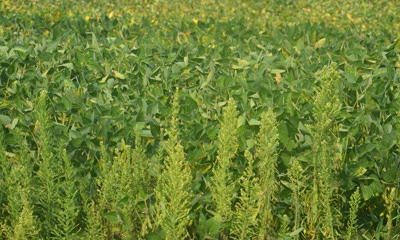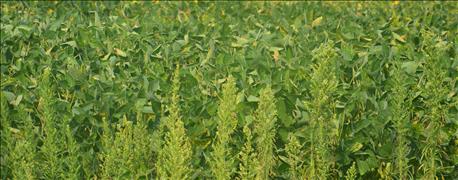
Garrett Dobson is glad he didn’t let one bad experience with cover crops prevent him from trying them again. He points to three key benefits that cover crops provide.
Dobson, Rensselaer, farms with partner Gary Streitmatter. Dobson listens to advice from Dan Perkins, with the Jasper County Soil and Water Conservation District, before making his own decisions. Perkins, also a local watershed director and an Indiana Certified Crop Adviser, is known in the area as the "cover crop guy."
Here are three key benefits Dobson reaps due to managing cover crops on his farm.
1. Less soil erosion and cleaner water.

FIGHT MARESTAIL: If marestail is one of the weeds you fight constantly, cover crops, and especially cereal rye, might help you gain an edge on knocking it out.
“The runoff that comes off my fields after a rain is definitely cleaner than it was before,” Dobson relates. He attributes a good portion of that observation to using more cover crops.
Dobson also believes the water that does run off carries fewer nutrients. He believes cover crops help capture and tie up nutrients in the fall and spring. He would much rather keep those nutrients in the soil to provide nutrition to future crops than to lose them in water that leaves his fields.
Keeping soil in place is especially a concern on the sandier soils Dobson farms. He does his best to keep sandy fields covered with something growing during as much of the year as possible.
2. Tougher weed control.
Many people list help with weed control somewhere down the line in a lot of benefits from cover crops. Perhaps that’s because it’s hard to quantify exactly how much help you get on weed control. It likely varies with the species of cover crops you grow and the weed spectrum in your field.
Dobson believes the weed control help is real and suggests it’s a major benefit of using cover crops. “It’s a huge benefit in helping us hold back marestail,” he says. “I’ve paid attention to marestail problems where there was a cover crop and where there wasn’t one. So far I always have less trouble with marestail after a cover crop.”
Dobson uses primarily cereal rye. It’s one of the cover crops most often mentioned as helping put pressure on marestail.
“Marestail doesn’t like competition,” Perkins says. “Cereal rye is very competitive in the spring. This can be a huge benefit for cover crops.”
3. Meeting specific needs of the farm.
Annual ryegrass was promoted heavily when the cover crop explosion began in Indiana. Many people use it and praise it for growing deep roots that loosen the soil. For Dobson, one advantage to cover crops is that he can use something entirely different than annual ryegrass and still reap many benefits. He uses primarily cereal rye. Annual ryegrass doesn’t fit his system as well as it does elsewhere.
“I see more trouble getting it established,” Dobson says. “It would be tough for me to get it seeded early enough in the fall. There’s also the challenge of killing it in the spring. For me, cereal rye is the better option.”
About the Author(s)
You May Also Like




